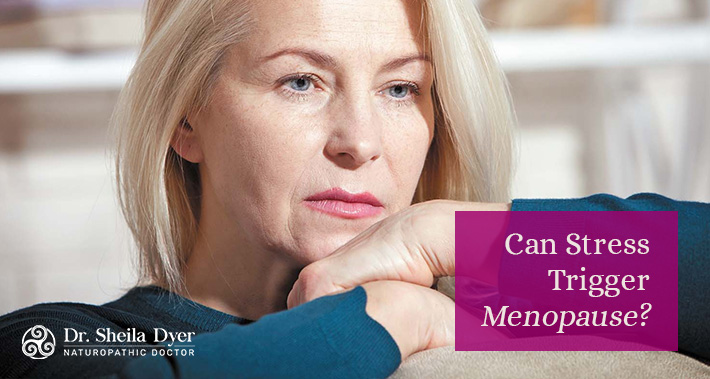We’ve all heard about menopause and the changes it brings.
Your periods slow down and eventually stop altogether.
You may experience hot flashes, night sweats, disrupted sleep, and mood swings just to name a few of the common symptoms that go along with this transition.
Menopause represents a huge change in your life as your fertility decreases and you enter a new phase of life.
Menopause is not an easy time for most people and can bring its own stresses to your daily life.
But is it possible for stress to trigger early menopause?
As a naturopathic doctor in Toronto I help people deal with the symptoms of menopause.
Let’s take a look at the relationship between menopause and mental health.
What is Menopause?
Menopause is a natural transition and is not in itself cause for concern.
It happens as the body’s ovaries stop producing estrogen, testosterone, and progesterone, which in turn stop the body from menstruating.
Menopause causes a great deal of changes in the body as it adjusts to new hormone levels. Menopause often begins with changes in the menstrual cycle.
The length of the cycle can often become shorter and you may skip several periods only to have them occasionally come back.
Menopause is usually diagnosed after one has gone a full 12 months without a period.
When Should You Begin Menopause?
According to the CWHN, in Canada, the average age of menopause is 52, but it’s common for it to start as early as 46.
However, approximately 1 in 100 people who menstruate will experience menopause before the age of 40.
What Causes Early Menopause?
There are a number of causes of early menopause.
Some of those include surgery, cancer treatment, autoimmune diseases, and genetics.
Early menopause can also be linked to poor diet, heavy drinking, cigarette smoking, and surprisingly, stress.
This includes physical stress which can be brought on by a number of causes such as anorexia or long-distance running.
Symptoms of Early Menopause
The symptoms of early menopause have a lot of overlap with the symptoms of stress.
While the symptoms of early menopause are very similar to the symptoms of regular menopause, they can also be more severe.
Some of the symptoms include:
- Pain
- Irritability
- Reduced interest in sex
- Digestive health issues
- Depression
- Trouble sleeping
- Forgetfulness
- Mood swings
- Anxiety
Can Stress Trigger Early Menopause?
As mentioned earlier, early menopause can be spurred by a number of different conditions.
However, while stress combined with other factors such as poor diet or smoking, can spur early menopause, there is no evidence that stress is the sole cause of it.
Of course this means that in addition to taking care of your physical health, you should take care of your mental health as well.
Natural Stress Management Tips
As you may know, stress is linked to several health issues so it’s vital to take steps to reduce your overall stress.
The good news is that there are a number of great ways to reduce your stress naturally.
Getting regular exercise like going for a walk, a hike, or cycling will help your body to manage stress by working off nervous energy, getting your heart pumping, and releasing endorphins.
It is also helpful to take time to do relaxing activities like mindfulness meditation, yoga or breathing exercises.
In addition to these changes, you can also help yourself by trying some of the following suggestions:
1. Try Adaptogenic Herbs
Most of us are aware that there are several herbal solutions to help us deal with the stresses of daily life.
As a naturopathic doctor, I have a lot of knowledge about different herbs that can help you to reduce stress.
Lavender is a well-known and easy to find herb that is not only wonderful at reducing stress but is also a well known sleep aid.
From sachets of lavender that you can hang around your home to bath products or essential oil, making lavender part of your life is easy and useful.
Kavakava is a member of the nightshade family has been shown to reduce anxiety.
You can get kavakava easily with tea but it is also available in the form of tinctures, capsules, and liquids.
Just be sure to work with your naturopathic doctor to figure out the correct dosage as excess kava can cause stress to the liver.
Licorice root is another helpful herbal remedy that works by preventing adrenal fatigue and helping your body to de-stress.
You can find licorice root easily in the form of dried herbal tea, powder, tinctures, or topical gel.
Holy basil is another herb that is a medicinal powerhouse.
Not only does holy basil reduce anxiety and stress but it is also antibacterial, anti-fungal, anti-inflammatory and analgesic, making it an excellent tool for your overall health.
Eleuthero, otherwise known as Siberian ginseng, helps to protect the body from oxidative stress by regulating the immune system and how the body’s hormones react to stress.
Eleuthero can be found in the form of tinctures, tea, and supplements, and is generally considered safe with a low risk of side effects.
Rhodiola, also known as golden root, is another herbal remedy that can help with fatigue, depression, concentration, and other mood disorders, and has been found to relieve anxiety to a clinical degree.
You can find rhodiola in the form of a supplement, tea, or tincture.
2. Supplement with Magnesium
Magnesium plays a critical role in the body and studies have shown that a lack of magnesium in the body can lead to a number of problems such as headache, fibromyalgia, chronic fatigue syndrome, and physical stress, amongst others.
Supplementing with magnesium helps the body to manage its stress response system, stabilize mood, and improve sleep quality.
3. Supplement with Vitamin C
A German study found that supplementing the body with 3000 mg per day of vitamin C had a positive effect on blood pressure and the body’s “subjective stress response” when test subjects were submitted to a psycho-social stressor.
In addition to vitamin C’s positive effects on the immune system and as an antioxidant, it has a very positive effect on stress reactivity.
4. Opt For Some Healthy Comfort Foods
The most obvious answer to helping you deal with stress is making sure you eat healthy.
It’s easy to reach for classic comfort foods when you’re feeling stressed but remember that what you eat can also have an impact on how you feel.
The good news is that even when you are concerned about your health, you can still enjoy chocolate.
Dark chocolate is a great way to satisfy your sweet tooth while also helping you to relieve stress at the molecular level.
Some research indicates that daily consumption of dark chocolate can help people who are suffering from high levels of anxiety.
Oatmeal is another great food to help you battle stress.
Not only can oatmeal reduce stress hormones but it can also help to boost serotonin which in turn helps you to feel calm.
Find ways to incorporate your favourite healthy foods into your meals and snacks and your body will thank you for it.
Book an Appointment with Dr. Sheila Dyer, ND
Are you stressed out?
Are you concerned about the symptoms you are experiencing with menopause or that stress may be causing you to experience menopause early?
Contact me, Dr. Sheila, and I will help you find natural solutions to your stress and menopause issues.
If you have questions about naturopathic medicine, or would like to start with your first consultation let’s book an appointment.
If you have questions about naturopathic medicine, or would like to start with your first consultation, contact me, and let’s book an appointment.
Dr. Sheila Dyer, ND1080 Dovercourt Rd,
Toronto, ON M6H 2X8
(416) 554-5135
► https://g.page/DrSheilaDyerNd
Dr. Sheila Dyer is a Naturopathic Doctor and a practicing registered nurse offering holistic healthcare with a scientific focus

